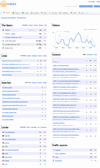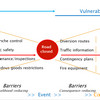 I admit this does sound funny, but is it possible to say that a blog has a supply chain? And if that is the case, are blogs exposed to supply chain risks? That is the question I’ve been asking myself over the last couple of days. Take this blog for instance. Traffic is slowing down these days, and I’m trying to understand why. Yes, I know it’s the Holiday Season, and all the students perusing my blog have handed in their term papers, and are no longer in need of my literature reviews, but still, that can not account for all the slowdown? What is happening to my blog? This slightly humorous post takes a look at my blog from a supply chain perspective.
I admit this does sound funny, but is it possible to say that a blog has a supply chain? And if that is the case, are blogs exposed to supply chain risks? That is the question I’ve been asking myself over the last couple of days. Take this blog for instance. Traffic is slowing down these days, and I’m trying to understand why. Yes, I know it’s the Holiday Season, and all the students perusing my blog have handed in their term papers, and are no longer in need of my literature reviews, but still, that can not account for all the slowdown? What is happening to my blog? This slightly humorous post takes a look at my blog from a supply chain perspective.
The supply chain of a blog
How can a blog have a supply chain? My blog is a product, a product that consists mainly of literature reviews, for which there hopefully is a demand. In my mental model, using the traditional supply-company-customer chain, my demand are my readers seeking information, and my suppliers are the sources I use for making my posts, e.g. academic journals, books, and other blogs/websites. My distribution channels are search engines, blog directories, and other blogs/websites, albeit the latter is not always my choice, since I must rely on that other blogs are going to link to me or allow my comments.
So, is it possible for a blog to have variable demand (as in number of readers)? Or variable supply? And can supply chain disruptions happen? If a blog does have a supply chain, how does it work?
Demand side
My 1st tier customers are those readers who have bookmarked my blog or are subscribing to it via RSS or e-mail. My 2nd tier customers are those readers who find my blog via search engines, e.g. Google, blog directories, e.g. my account on BlogCatalog, other blogs, e.g. the Kinaxis blog that has me on their blogroll, or via social media, e.g. my profiles on Twitter, LinkedIn, Facebook or others. Note that the arrow goes in both directions with the latter three; this is because here I need to supply my blog or posts for them to be found. Actually that goes for Google, too, but perhaps to a lesser degree, i.e. SEO-scuplting of my blog.
Supply side
My 1st tier suppliers are blogs and sites that I have have bookmarked or subscribe to. This also includes academic journals. My 2nd tier suppliers are what I find through search engines, by scouring blog directories or by engaging in social media sites. In addition there are also offline sources, e.g. books and newspapers, TV and radio, leading to further offline sources, e.g. references in an article I read. Offline sources can also lead to other online sources as well.
The supply chain risk of a blog
Using Martin Christopher’s model I can separate the risk into supply-side risk (not finding enough to write about) and demand-side risk (not having enough readers). In addition there is the internal operational risk as to where and how I make my product, and where I decide to distribute it. The blog supply chain risk management will be the topic of my next post. Does my blog need a business continuity plan? Perhaps…
Join the discussion
Here are the answers I got when I asked the question “Does a blog have a supply chain? on LinkedIn. Not all agree that a blog has a supply chain. Feel free to add your answer on LinkedIn or add your comment below. In a later post I will summarize and reply to the comments/answers.
Links
- linkedin.com: Does a blog have a supply chain?













